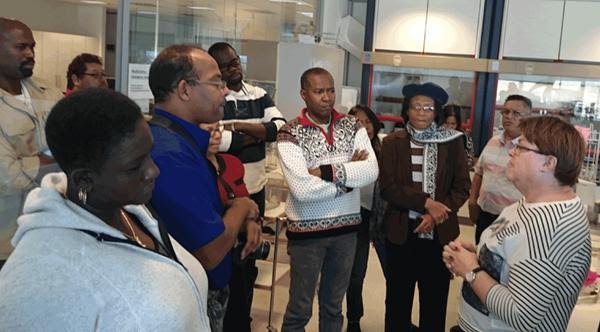With support from IICA, Caribbean countries studied Iceland’s experience with the aim of strengthening their value chains and sanitary and phytosanitary measures.

Belize City, Belize, 21 April, 2016 (CRFM) – A group of professionals from CARIFORUM States (countries comprising the Caribbean Community and the Dominican Republic) will be able to contribute to the on-going task of guaranteeing the safety of imported and exported food in their respective countries, thanks to a recent training event on sanitary and phytosanitary management in which they participated.
Held in Iceland, the course was part of the Sanitary and Phytosanitary (SPS) Measures Project funded by the European Union under the 10th European Development Fund (EDF) and implemented by the Inter-American Institute for Cooperation on Agriculture (IICA).
Caribbean countries have a wealth of marine resources from which they cash out hundreds of millions of dollars a year to support national economies by providing good jobs, food and foreign exchange, among other benefits.
However, in order to remain active and competitive in the global marketplace, countries must find ways to improve their Sanitary and Phytosanitary (SPS) Systems.
“Developing SPS capacities is just part of our overall strategy for improving competitiveness, adding value and building resilience to climate change, while addressing supply chain challenges facing the fisheries and aquaculture sectors in our countries,” stated Milton Haughton, Executive Director of the Caribbean Regional Fisheries Mechanism (CRFM), the agency coordinating the fisheries sub-component of the project.
According to Susan Singh-Renton, Deputy Director of CRFM, participants got a first-hand look at the fishing industry, interacted with industry operators involved in fish handling and processing, and broadened their knowledge of virtual fish sale auctions, marketing, aquaculture, food safety, technology development, and business networking for the creation of new products.
“Many industry operators emphasized the fact that sustainable management of the natural fish resource was at the heart of Iceland’s fishing industry development and is an SPS success story,” she stated.
Compliance with SPS measures is essential to improving the region’s standing in the global market.
The value of learning
According to Endhir Sosa, one of the trainees from Belize, improving food safety and quality along the entire food chain leads to an increase in the value of primary products.
“Collaboration and joint work among the industry, government and academia have helped to ensure safe and high quality seafood products,” he stated.
Sosa mentioned several aspects that caught his attention. One of them was the ability to trace products electronically rather than on paper; in other words, the application of modern technology that allows for a more complete, accurate and faster tracking of any fishery product.
The issue of food fraud and the many different uses of fish to make cosmetics, clothing, and post-surgical skin patches, were also thought-provoking topics. “It’s no longer only about fish fillets. Today, Iceland uses up to 82% of the cod fish caught,” Sosa said.
The SPS Project, seeks to strengthen the capacity of the Caribbean region to build its legal framework on this topic. The Project is backed by the 10th EDF to support the Caribbean Forum of the African, Caribbean and Pacific (ACP) States in the implementation of commitments undertaken under the Economic Partnership Agreement (EPA) to strengthen Sanitary and Phytosanitary (SPS) Measures.
With information from a CRFM press release.
For additional information, please contact: ena.harvey@iica.int











